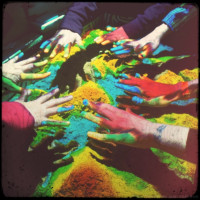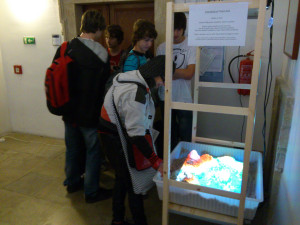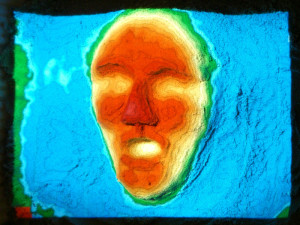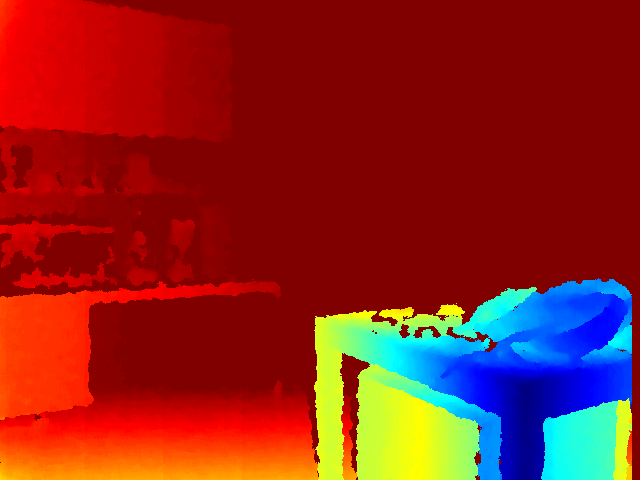Table of Contents
AR SandBox
~~META: status = in restart process &relation firstimage = :project:sarndbox-foto_by_alef.jpg ~~
Augmented Reality SandBox is quite nice concept where you play with sand and a projector mounted on top of the sandbox projects constantly updating height-map on it. We've prepared a few installations.
Basic Instructions
Just start piskoviste.brm PC and everything should start by itself.
Autostart
Add following shell script to your Window Manager autostart scripts (i.e. Settings→Session and startup in XFCE4)
- ~/Desktop/SARndbox
/bin/nice -n -10 /home/brmlab/PISKOVISTE/SARndbox-1.5-001/bin/SARndbox -rs 0 -wo 9999 -loadView /home/brmlab/Desktop/SavedViewpoint0001.view &
The script above increases niceness of an SARndbox process. Increasing niceness to negative values is not allowed for non-privileged user by default in common Linux distros. We can allow user brmlab to do so by adding following lines to /etc/security/limits.conf (Fedora)
- /etc/security/limits.conf
brmlab hard nice -15 brmlab soft nice -11
Fullscreen mode by default
open Vrui.cfg, find in Window section and change windowFullscreen value from false (default) to true
- ~/Vrui-3.1/etc/Vrui.cfg
section Window windowPos (0, 0), (1024, 768) windowFullscreen true
Power Management
Piskoviste.brm PC
in xfce4-panel go to “Applications menu→Settings→Power manager” and monitor and PC to go to sleep after some amount of time.
Projector
Set “auto power off” to ON and “timeout” to i.e 15min. Having no input from graphic card projector will turn off automatically after amout of time set.
Software
SARndbox
Software created by Oliver Kreylos for W.M. Keck Center for Active Visualization in the Earth Sciences, UC Davis Tahoe Environmental Research Center, Lawrence Hall of Science, and ECHO Lake Aquarium and Science Center. See http://idav.ucdavis.edu/~okreylos/ResDev/SARndbox/ for more info.
Calibration
It may be quite hard to find out how to calibrate for the first time, so i will document it here a bit
Kinect (Height calibration)
Tou have to manually edit files in PISKOVISTE/SARndbox-1.5-001/etc/SARndbox-1.5/ :
BoxLayout.txt:
(-0.0076185, 0.0271708, 0.999602), -115.0000 ( -48.6846899089, -36.4482382583, -111.8705084084) ( 48.3653058763, -34.3990483954, -106.3884158982) ( -50.674914634, 35.8072086558, -114.4082571497) ( 48.7936140481, 36.4780970044, -108.74159795)
The important is the last number in each line - in the first line is z-offset of sea level, the four lines are corner calibration points (must be always higher value than the sea level offset). To move sea level up, increase the value on all lines by the same amount.
HeightColorMap.cpt:
-15.0 0 0 80 -7.0 0 30 100 -6.0 0 50 102 -3.5 19 108 160 -0.75 24 140 205 -0.25 135 206 250 -0.05 176 226 255 0.0 0 97 71 0.25 16 122 47 2.5 232 215 125 5.5 161 67 0 8.0 130 30 30 13.0 161 161 161 19.0 206 206 206 24.0 255 255 255
Mapping from height to colors. Adjust the appropriate z-offsets (first column) to compress/spread colors across heights.
Projector (plane mapping)
- click+drag = tilt
- mouse wheel = zoom
- press “Z” + drag = pan
IAMap SandBox
WORK IN PROGRESS
CUstom reimplementation of AR Sandbox that is capable of running on less-advanced hardware than SARndbox (which requires quite decent graphics card), designed with ARM platform in mind (like Raspberry Pi or BeagleBoard).
Installations
FreezeFest 2012
This installation was created for DIY festival FreezeFest 2012. It used ad-hoc on-site construction, around 60kg of sand and SARndbox software (see below).
OjuHr8QgUP0
05I3E7Hf1P0
3fyW9XfEtms
JDI 2012
This installation was created for One Day with Informatics event held at Charles University Prague. It used IKEA1 construction, 50 kg of sand and SARndbox software (see below).
Construction
IKEA1
This portable construction was used for JDI 2012 installation (see photos above) and will be stationed at brmlab. It uses the following components from IKEA (hence the name):
- 2x IVAR Side Unit 50×179 cm - http://www.ikea.com/gb/en/catalog/products/63756709
- 2x IVAR Shelf 83×50 cm - http://www.ikea.com/gb/en/catalog/products/90166576
- DILLING Underbed Storage Box - http://www.ikea.com/gb/en/catalog/products/90027811/
- 4x SAMLA box 11l - http://www.ikea.com/gb/en/catalog/products/40102978/ (to carry the sand)
IKEA2OBI
This portable construction is built from IKEA components and custom parts from OBI.
- 3x VIKA LERBERG Trestle - http://www.ikea.com/gb/en/catalog/products/80130776/
- custom parts from OBI
AR SandBox^2
The new software is based on Python + OpenCV + libfreenect to abadon that crappy software from the distant past and make hardware requirements as low as possible (lets convert from tower PC to raspberry).
- piskoviste.py
#!/bin/python from freenect import sync_get_depth as gdepth import cv2 import numpy as np def loopa(): global depth while True: (depth,_) = gdepth() npd=np.array(depth) mn=npd.min() npd[npd>1000]=1000 # Eliminate kinect artefacts, constant to be fitted manually #print(npd.max()) npd-=mn mx=npd.max() npd2=npd*(255/mx) npd=np.floor(npd2).astype(np.uint8) # Debugging histrogram START # himg=np.zeros((300,256,1)) # hst=cv2.calcHist([npd],[0],None,[256],[0,2048]) # cv2.normalize(hst,hst,0,255,cv2.NORM_MINMAX) # hst2=np.int32(np.around(hst)) # pts=np.column_stack((np.arange(256).reshape(256,1),hst2)) # cv2.polylines(himg,[pts],False,(255,0,0)) # Debugging histogram END fdepth=cv2.applyColorMap(npd,cv2.COLORMAP_JET) cv2.imshow('dpth',fdepth) #cv2.imshow('hst',himg) # Debugging histogram if cv2.waitKey(1) & 0xFF == ord('q'): break cv2.namedWindow("dpth", cv2.WND_PROP_FULLSCREEN) cv2.setWindowProperty("dpth",cv2.WND_PROP_FULLSCREEN,cv2.WINDOW_FULLSCREEN) loopa() cv2.destroyAllWindows()
Environment preparation
Easiest way to do anything pyrelated without fighting incompatible python versions is to create virtual environment (venv).
apt-get install python3-venv python-opencv libusb-dev libusb-1.0.0-dev python3-dev mkdir ./piskoviste cd ./piskoviste wget "https://github.com/OpenKinect/archive/master.zip" unzip "./master.zip" python3 -m venv venv source ./venv/bin/activate pip install --upgrade pip pip install matplotlib pip install numpy pip install opencv-python pip install cython mkdir ./libfreenect-master/build cd ./libfreenect-master/build cmake -L .. -DBUILD_EXAMPLES=OFF -DBUILD_PYTHON3=ON make make install cd ../wrappers/python python ./setup.py install cd ../../.. wget "piskoviste.py_Z_BRMLABI_WIKI" python ./piskoviste.py
Result
Similar Projects
SandyStation
SandyStation was created at Faculty of Applied Sciences, University of West Bohemia, Pilsen by Petr Altman and Robert Eckstein
more useful links




